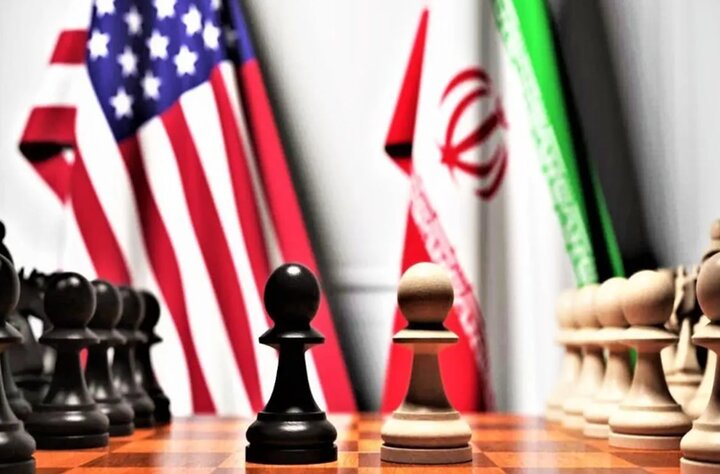America’s Contradictory Messages to Iran: Policy Incoherence or Negotiation Trick?
In the first weeks of 1404, the ground was prepared for indirect talks between the Islamic Republic of Iran and the United States of America. The first round of these talks was held on 11 April 2025 in Muscat, the capital of Oman, with the mediation of the country, informally and behind closed doors. The meeting, which took place in silence, was mainly dedicated to exchanging messages and assessing the readiness of the parties to resume the diplomatic process.
Subsequently, the second round of talks was held on 19 April 2025 in Rome, Italy, of course, with Oman hosting and mediating. Published reports indicate that the overall atmosphere of the talks was assessed as positive and that the third round of these talks is scheduled to be held again in Muscat in the coming days. The continuity of these three meetings indicates a slow but continuous effort to untie the knots in the relations between Tehran and Washington.
However, the positive atmosphere of the negotiations has been accompanied by a series of contradictory statements and actions by American officials. From the sudden change of position on Iran’s right to enrich uranium, to the simultaneous imposition of new sanctions, the insistence on direct negotiations while the talks continue indirectly, etc., all are signs of strategic instability and multiplicity in the Trump administration’s foreign policy, of which this article will point out a few of the contradictions;
1. Sudden change of position on uranium enrichment
One of the most prominent signs of contradiction in the US positions during the recent negotiations was the contradictory statements of “Steve Whittock”, Trump’s special representative in the negotiations, regarding Iran’s right to enrich uranium. He initially announced in an interview with Fox News on April 17 that the Trump administration might agree to Iran continuing to enrich uranium to the 3.67 percent level allowed by the JCPOA, provided that Iran granted full access to International Atomic Energy Agency inspectors. These statements were interpreted in the international media as a concession or flexibility on the part of the Trump administration.
However, just a few hours later, an official statement issued by Whitaker’s office and the US National Security Council indicated a completely different position. The statement explicitly emphasized that no uranium enrichment on Iranian soil was acceptable and that the United States would only be willing to agree to an agreement if Iran dismantled its entire nuclear infrastructure. The use of the term “Trump deal” in the statement refers to a more aggressive stance than the JCPOA, an agreement that Trump withdrew from in 2018. This apparent contradiction not only indicates a lack of cohesion in the new US diplomatic team, but also caused severe distrust on the Iranian side. Of course, some attributed this rapid change of position to internal differences in the Trump administration.
2. Insistence on direct negotiations versus Iran’s emphasis on indirect negotiations
Another serious contradiction in the US positions concerns how negotiations with Iran are being conducted. While Whittaker has repeatedly spoken in the American media of “the beginning of direct negotiations with Iranian officials” and has even introduced this as a major achievement for the new administration, Iranian officials have explicitly rejected this claim.
This contradiction not only indicates a difference in narratives, but has also led to the formation of two completely different images of the diplomatic process in public opinion. Washington is trying to portray these talks as a sign of Iran’s retreat and the victory of the maximum pressure policy.
From the experts’ point of view, the reason for this duality in the US positions could be related to the competition within the Trump administration and the attempt to manage domestic public opinion. Trump, who considers himself the architect of a tough policy against Iran, does not want the new negotiations to appear as if the US is retreating from its previous positions. For this reason, some officials in his administration are trying to interpret the atmosphere of the talks in their favor and pretend that Iran has been forced to negotiate directly.
3. Imposing new sanctions simultaneously with the offer of negotiations
One of the most important contradictions observed in recent weeks by the Trump administration is the simultaneous action of imposing new sanctions against Iran and proposing negotiations. While American officials have repeatedly spoken of their readiness to reach a new agreement, on April 9, 2025, the US Treasury Department added several Iranian entities related to the nuclear industry to the sanctions list. This action was taken just a few days before the second round of talks in Rome and sent a very negative political message to the Iranian side. Also, on the eve of the second round of talks, the United States imposed a series of oil sanctions against Iran.
This ambivalence in American behavior has led many political analysts to consider Washington’s foreign policy to be incoherent and in crisis in decision-making. From Tehran’s perspective, the new sanctions are not only a violation of the spirit of dialogue and diplomacy, but also a sign of the lack of real will in the White House to reach an operational agreement. Iranian officials have emphasized that the “language of threats and sanctions” is incompatible with negotiations and that continuing this approach will weaken the path of negotiations.
On the other hand, some Trump administration officials have introduced these sanctions as “a pressure tool to strengthen America’s hand in negotiations.” However, this justification, according to many observers, not only does not facilitate negotiations, but also makes the atmosphere more tense. Especially since Iran had previously stated many times that negotiations under the pressure of sanctions are meaningless and that any concessions are conditional on Washington taking confidence-building steps.

